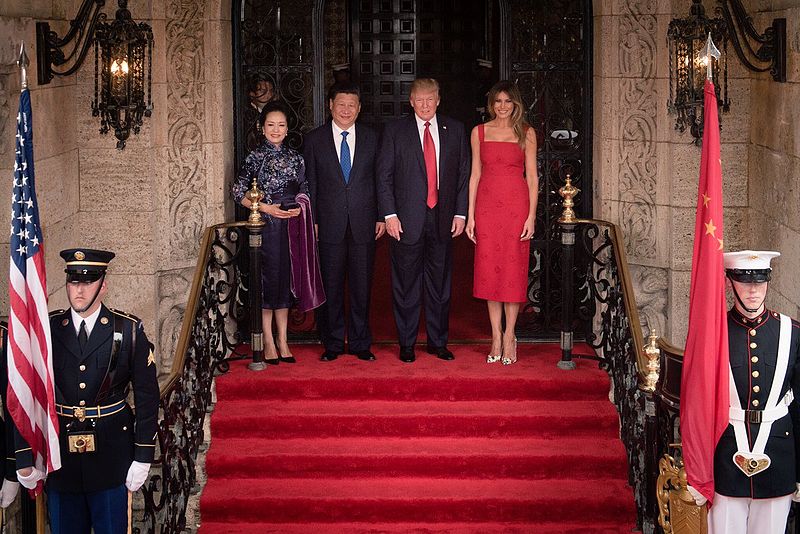
“Why would I call China a currency manipulator when they are working with us on the North Korean problem?” tweeted President Donald Trump on Easter Sunday.
Earlier, after discovering “great chemistry” with Chinese President Xi Jinping over “the most beautiful piece of chocolate cake” at Mar-a-Lago, Trump had confided, “I explained . . . that a trade deal with the U.S. will be far better for them if they solve the North Korean problem!”
“America First” thus takes a back seat to big-power diplomacy with Beijing. One wonders: How much will Xi end up bilking us for his squeezing of Kim Jong Un?
Trump once seemed to understand how America had been taken to the cleaners during and after the Cold War. While allies supported us diplomatically, they piled up huge trade surpluses at our expense and became virtual free-riders off the U.S. defense effort.
No nations were more successful at this than South Korea and Japan. Now Xi is playing the game—and perhaps playing Trump.
What is the “North Korean problem” Beijing will help solve in return for more indulgent consideration on future U.S.-China trade deals?
North Korea’s nuclear arsenal. As 80 percent of Pyongyang’s trade comes through China, Trump believes that Beijing can force Kim to stop testing missiles and atomic bombs before he produces an intercontinental ballistic missile that could hit the U.S.
But what is to prevent Xi from pocketing Trump’s concessions and continuing on the strategic course China has long pursued?
For in many ways, Pyongyang’s goals parallel China’s.
Neither could want an all-out war on the Korean Peninsula. For Kim, this would devastate his country, bring down his regime, and cost him his life. For China, war could mean millions of Koreans crossing the Yalu into Manchuria and a disruption of Beijing’s march to Asian hegemony.
A continuing crisis on the peninsula, however, with Trump and the U.S. relying on Beijing’s help, could leave Xi in the catbird seat.
And now that North Korea has declared its goal to be building missiles with nuclear warheads that could hit all U.S. bases in Asia—and even California—the clock is running for the White House.
“It won’t happen,” Trump has said of North Korea’s developing an ICBM that could hit the United States. “If China is not going to solve North Korea, we will.”
“The threat is upon us,” says outgoing deputy national security adviser K.T. McFarland. “This is something President Trump is going to deal with in the first year.”
Secretary of State Rex Tillerson and Vice President Mike Pence have declared that our policy of “strategic patience” with Pyonyang is at an end.
National security adviser H.R. McMaster said Sunday the U.S. has “to take action, short of armed conflict, so we can avoid the worst” in dealing with “this unpredictable regime.”
With a stunning parade of missiles in Pyongyang on Saturday, the North’s failed firing of a solid-fueled missile that same day, and the promise of new missile tests weekly, Kim is forcing our hand.
Either he backs away from building atomic bombs and long-range missiles or Trump and his generals must make good on their warnings.
How did we get to this point?
Why, 64 years after the Korean War, a quarter-century after the Cold War, are we still obliged to go to war to defend South Korea from a North with one-half the South’s population and 3 percent of its gross domestic product?
Why are we, on the far side of the Pacific, still responsible for containing North Korea when two of its neighbors—Russia and China—are nuclear powers and South Korea and Japan could field nuclear and conventional forces far superior to Kim’s?
How long into the future will containing militarist dictators in Pyongyang with nuclear missiles be America’s primary responsibility?
Another issue arises. Before the U.S. launches any pre-emptive strike on North Korea, Congress should be called back into session to authorize any act of war against the North.
Perhaps this time, Congress would follow the Constitution.
Though Korea is the crisis of the moment, it is not the only one.
Not since 9/11 have the Afghan Taliban been stronger or controlled more territory. The United States’ commanding general there is calling for thousands more U.S. troops. Russia and Iran are reportedly negotiating with the Taliban. Pakistan is said to be aiding them.
To counter Vladimir Putin’s Russia, we have moved U.S. and NATO troops into Poland, the Baltic States, Romania and Bulgaria. We have fired missiles into Syria. We are reportedly preparing to back the Saudis in the latest escalation of their war on the Houthi rebels in Yemen.
Twenty-four years after “Black Hawk Down,” the weekend brought reports of U.S. troops returning to Somalia.
The promise of a Trump presidency—that we would start looking out for our own country and own national interests first and let the rest of the world solve, or fail to solve, its own problems—appears, not 100 days in, to have been a mirage.
Will more wars make America great again?
Patrick J. Buchanan is the author of the new book The Greatest Comeback: How Richard Nixon Rose From Defeat to Create the New Majority. To find out more about Patrick Buchanan and read features by other Creators writers and cartoonists, visit the Creators website at www.creators.com.
COPYRIGHT 2017 CREATORS.COM
Leave a Reply